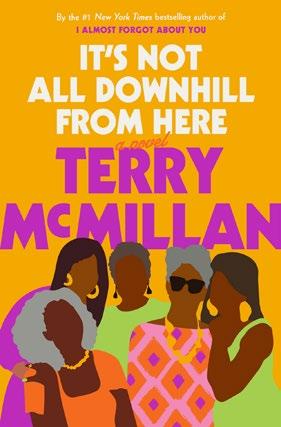
5 minute read
Justice and Injustice
Author Terry McMillan Returns to Miami Book Fair Latest Novel Follows Four Aging Black Women as
They Figure Out If Life Is “All Downhill”
Advertisement
BY RUSSELL MOTLEY
At 69, bestselling fiction writer Terry McMillan says she feels great. In fact, the author of Waiting to Exhale and How Stella Got Her Grove Back gracefully demonstrates that life for card-carrying AARP members isn’t necessarily all downhill as her latest
novel suggests. “A lot of young people think that when you pass 50, they really do think it’s all downhill,” McMillan told M·I·A magazine in a phone interview from her Pasadena, Calif. home. “Even older people think it’s all downhill. And some of them live their lives like they’re 10 minutes away from dying. So why bother exercising? Why bother going on a vacation? And I think that’s total BS.”
In It’s Not All Downhill from Here, McMillan’s primary characters are all girlfriends from high school in Pasadena who are now pushing 70. It’s a pivotal, often challenging age that finds them battling everything from diabetes to depression, parenting adult children, keeping track of elderly parents, and coping with the loss of loved ones.
Loretha “Lo” Curry’s world takes a devastating blow when she suddenly becomes a widow. The 69-yearold the beauty supply store owner admittedly feels as ugly and old as the establishment she runs. Not expecting to be single at her age, Lo says to herself: “When I sat down for a minute, it hit me that I had not been kissed or hugged or had sex in almost a year. It’s the longest I’d ever gone since I was in my thirties… I decided that if I couldn’t have sex, I would bake.”
Not exactly a comparable alternative, but McMillan suggests that life for older Black women, particularly their physical appearance, is often held to a different

standard than for men the same age. “You see how we age more so than do men. We start putting on weight… We are known for it,” said McMillan, who maintains that the characters in this novel are not based on her life, aside from her living with diabetes. “And I’m not saying that the majority of AfricanAmerican women don’t take care of themselves but there are a lot of people that I know, and friends and family members, that are gone that shouldn’t be (gone) because we didn’t take care of ourselves and we just took a lot for granted.”
Not only must Lo watch her diabetes and take care of herself, she has also willingly committed herself to help save her troubled adult daughter’s life. She disappears for long periods of time and battles alcoholism and depression. It raises a larger question: Should aging parents ever give up on their grown kids despite their repeated set-backs and screw-ups?
“Some people suffer from depression that don’t even know how to recognize it. Sometimes people indict people for their mistakes or their shortcomings and idiosyncrasies,” said McMillan, a proud single mother to Solomon Welch, 36. “And I just wanted to paint an accurate picture of what happens when somebody that you love, especially your own child is going through something that you don’t understand. But you give yourself permission to understand it because you might help save their life.”
As Lo and her girlfriends deal with their respective crises, including girlfriend Sadie’s affair with a married minister which takes a surprising turn, the one constant thing in their 60-plus year sisterhood is the monthly dinners they host at their homes. At these gatherings, all of their personal business, good and bad, is put on
Terry McMillan the table. It’s where their lifelong bond is strengthened, or at least maintained. “I’m just interested in our behavior and how we can sometimes do more harm than anybody else. I just think it’s important that we give our best to ourselves and if we do that, we can give our best to others,” McMillan said. “And that’s what I was interested in exploring: how do we do that? How do we own up to and acknowledge how poorly or how well we treat ourselves? How honest can we be with ourselves? And how can we be good friends and good sisters, and good lovers and good mothers, and good wives? And sometimes you got to start with yourself.”
Unfortunately, the Coronavirus pandemic nixed McMillan’s 16-city book tour this year as well as a possible appearance at the Miami Book Fair, which is now virtual. Meanwhile, McMillan is spending this quarantine-time to write her next novel which, by the way, is not a sequel to “It’s All Downhill from Here.”
Although the subject matter in her latest novel may sound depressing, McMillan says she doesn’t intentionally write to depress. She writes to elevate the power of hope.
“Sometimes we have to accept that we are not perfect,” McMillan said. “That we do have the ability to make changes in our lives so that we can try to live our best lives. And there’s no age in which it’s too late, I don’t think.”

Russell Motley is M·I·A magazine’s editor-in-chief. He is a broadcast journalism professor at Florida Memorial University in Miami Gardens.
rm@miamediagrp.com. n
TAKE ON THINKING INDEPENDENTLY TOGETHER TODAY

In the past, we tended to shape our lives through stereotypes, applying limits on what society said was achievable – or appropriate -- for someone our age. This new era renders those old norms obsolete, and I say – good riddance. Let’s push back, start fresh, and throw away those outdated boundaries.
That’s where AARP comes in. We can help you navigate this changing world and make the most of today and tomorrow. Our new rallying cry is “Take on Today,” and we’re committed – we’re “all in” – to evolving to meet the new realities of aging.
So go take on today and every day, Florida.







